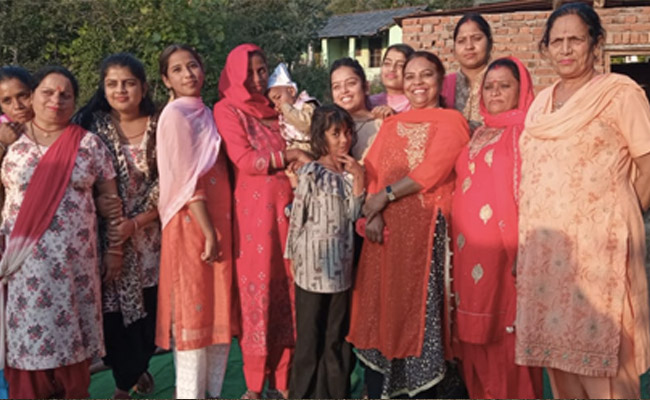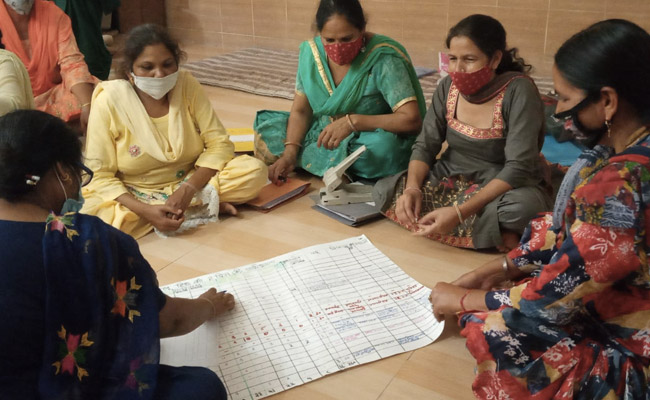New Delhi: Widowed at 23, three years after her marriage, Nirmal Chandel from Mandi, Himachal Pradesh was shunned and shamed. She was discriminated against for being a widow and at her own brother’s marriage, she was dubbed as a bad omen for the bride and the groom. The clothes she had bought for her brother with her own money were called ‘manhoos’ (bad luck) and the brother was told that if he wore clothes brought by a widow, he will die too like her husband. What was supposed to be a joyous occasion, became another painful memory for Nirmal.
My husband died in 1989 due to a heart attack at the age of 30 years, after which for a year, I was made to live in a dimly lit room without even a fan. People said I could not bear him any children and my evil eye had taken his life at such a young age. My own parents refused to stand by me and my in-laws treated me as a burden. I was not allowed to wear colourful clothes, eat with the rest of the family, attend functions or do anything that even remotely resembled a normal life, recalls Ms Chandel, who is now 56-year-old.
Ms Chandel added that she was contemplating suicide when an acquaintance told her about a non-governmental organisation that was working towards women’s welfare. In the pursuit of getting away from harsh conditions and gaining some independence, she decided to approach the NGO, seek help and give life another chance.
Also Read: Meet Padma Shri Awardee Tulsi Gowda, An Environmentalist Known As ‘Encyclopedia of Forest’
This is not the story of Ms Chandel alone. In many parts of India, especially in rural areas, widowed, divorced, abandoned and unmarried women are outcasted, deprived of basic rights and discriminated against based on their gender and marital status. To help secure their right to live with dignity and justice, a group of women in Rajasthan started a single women’s network ‘Ekal Nari Shakti Sangathan’ (ENSS) in 1999. The objective was to educate, empower single women and collectively fight against injustice and gender discrimination and break the gender bias.

Ekal Nari Shakti Sangathan was started with an aim to educate and empower single women and break the bias
The network has more than one lakh members and is operating in 10 states across India including Gujarat, Jharkhand, and Himachal Pradesh where Ms Chandel, who is now the National President of ENSS, established the network in 2005. Cultivating leadership qualities among rural single women is one of the main goals of ENSS, because of which, once discriminated against and denied their rights, these women are now community leaders and bringing about a change at the grassroots level.
From fighting for the rights of widowed, divorced, abandoned and unmarried women to get land ownership, pension and child support from the government, to fighting against domestic violence, for livelihood, access to health, nutrition, sanitation, adult education, and information technology and accessing training support in agriculture, practising organic farming, planting kitchen gardens, afforestation, rainwater harvesting, solar power and raising awareness about environment conservation and climate change, women of Ekal Nari Shakti Sangathan work on a host of issues.
While talking about what prompted ENSS to work on sustainability and the issue of climate change, Chandrakala Sharma, Rajasthan State Coordinator, ENSS said,
More than 50 per cent of the members of ENSS are farmers and farm workers who are heavily dependent on the climate for their food and livelihood. To these women, the impacts of climate change is clearly visible. Not only has the rainfall pattern become erratic but even the soil quality has changed due to erosion and deforestation. In rural areas, women and children are the worst sufferers of climate change. When the crops fail, the economic burden of the household increases manifold. Most of the farmers in Rajasthan and even other states are small and marginal farmers with small landholdings. They are forced to take loans and when they are unable to pay those, they get stressed which usually translates into worsened conditions for women and children of the house. Not only does the domestic violence increase against them, but young boys are forced to work as bonded labour and young girls are being married off early. There was no way that we could overlook these impacts of climate change on our women and children in the villages even though at the policy level and in the political discourse, this topic remains largely untouched. Reducing risk and vulnerability to climate change is extremely important for a safer future for our children.

Ekal Nari Shakti Sangathan is working on a number of issues including climate change and sustainablity
Vishnu Kuwar, a 53-year-old widow and member of ENSS from Matlana village of Dausa district of Rajasthan highlighted that in order to combat the impacts of climate change, women farmers are adopting sustainable farming methods that are more suitable for local land. She said,
Women of Ekal Nari Shakti Sangathan are raising awareness about organic farming. They are not only telling people about the harmful impacts of urea and other chemical fertilisers on the environment and humans but are also making organic fertilisers from animal waste, mud and worms and giving that to the farmers in their villages. They are producing more and more crops that suit the local climate like groundnuts, millets and are growing more and more fruit trees to provide nutrition and income. They are constructing embankments to capture rainfall and prevent runoff and soil erosion and planting grasses and fodder trees to provide fodder for cattle. ENSS women are also encouraging women in their villages to give up polluting energy like firewoods for cooking and shift to cleaner energy.
According to Ms Kuwar, there is a lot of strength in association and ENSS has been able to bring a change in their communities. They go door-to-door, conduct group discussions in their respective villages and use folk songs and art to raise awareness about sustainability among people and explain to them how people in villages, especially those dependent on forests, agriculture and fishery are on the frontlines of climate change, she said. ENSS works independently and also takes up projects in partnership with other NGOs in order to train women and equip them with relevant information, she said.
Radha Raghval, ENSS member in Kangra, Himachal Pradesh said that over the years, mitigation and adaptation to climate change through various methods like organic farming, using solar energy, making substitutes of plastic bags among others have become part of their livelihood programmes. She believes that women have the capabilities to be the agents of change within their communities. She said,
Women in rural areas are particularly vulnerable to climate change because their survival is dependent on their being able to obtain essential resources from the immediate environment such as forest, land, rivers. Their participation in responding and adapting to climate change must be recognised and supported. We, at ENSS Himachal Pradesh, are training women on dealing with natural disasters as well which are expected to increase due to climate change. Last year there were unusually large number of landslides in the state. Natural disasters also leave women vulnerable to sexual abuse, starvation, and other evils. Women need to learn to climb trees and swim and survive during disasters.
She pointed out that women in rural areas play a critical role in natural resource management within their household ranging from fetching water and cooking to taking care of crops and livestock. Therefore, they are more likely to notice the impacts of climate change than men. However, they face inequalities in accessing key information that would help them to plan for their climate concerns as they are less likely to receive education and have lower access to information technology. She asserted that gender equality and empowerment is important for combating climate change. According to Ms Raghval, women of ENSS are worried about the future of their children and are working for a better tomorrow with whatever resources they have at their disposal.
NDTV – Dettol have been working towards a clean and healthy India since 2014 via Banega Swachh India initiative, which is helmed by Campaign Ambassador Amitabh Bachchan. The campaign aims to highlight the inter-dependency of humans and the environment, and of humans on one another with the focus on One Health, One Planet, One Future – Leaving No One Behind. It stresses on the need to take care of, and consider, everyone’s health in India – especially vulnerable communities – the LGBTQ population, indigenous people, India’s different tribes, ethnic and linguistic minorities, people with disabilities, migrants, geographically remote populations, gender and sexual minorities. In wake of the current COVID-19 pandemic, the need for WASH (Water, Sanitation and Hygiene) is reaffirmed as handwashing is one of the ways to prevent Coronavirus infection and other diseases. The campaign will continue to raise awareness on the same along with focussing on the importance of nutrition and healthcare for women and children, fight malnutrition, mental wellbeing, self care, science and health, adolescent health & gender awareness. Along with the health of people, the campaign has realised the need to also take care of the health of the eco-system. Our environment is fragile due to human activity, that is not only over-exploiting available resources, but also generating immense pollution as a result of using and extracting those resources. The imbalance has also led to immense biodiversity loss that has caused one of the biggest threats to human survival – climate change. It has now been described as a “code red for humanity.” The campaign will continue to cover issues like air pollution, waste management, plastic ban, manual scavenging and sanitation workers and menstrual hygiene. Banega Swasth India will also be taking forward the dream of Swasth Bharat, the campaign feels that only a Swachh or clean India where toilets are used and open defecation free (ODF) status achieved as part of the Swachh Bharat Abhiyan launched by Prime Minister Narendra Modi in 2014, can eradicate diseases like diahorrea and the country can become a Swasth or healthy India.
[corona_data_new]























